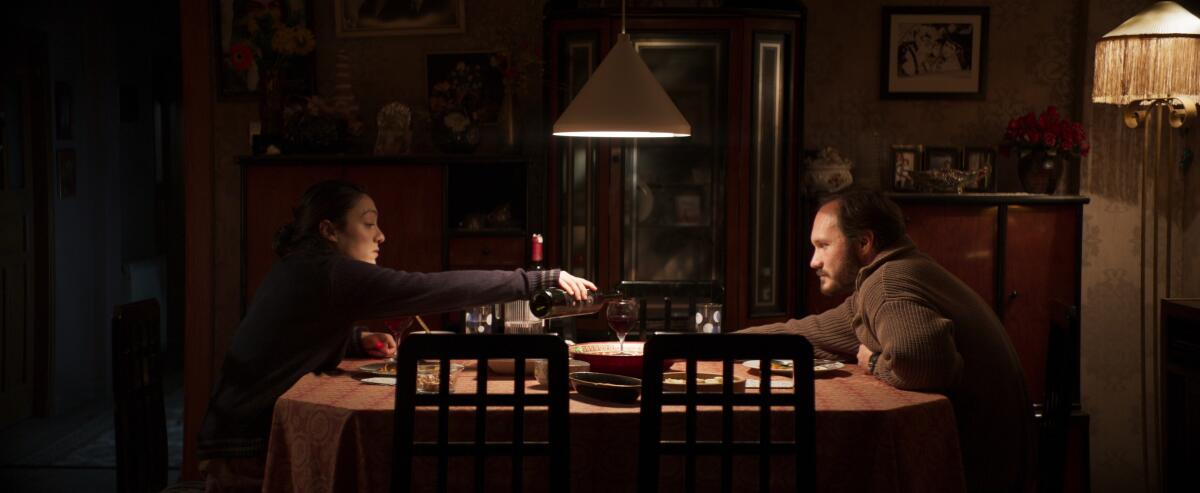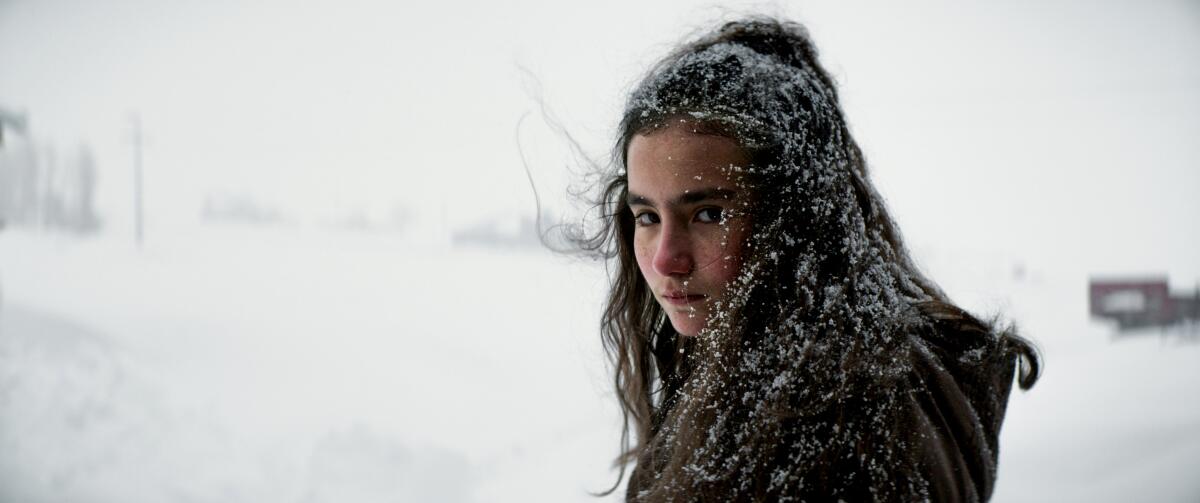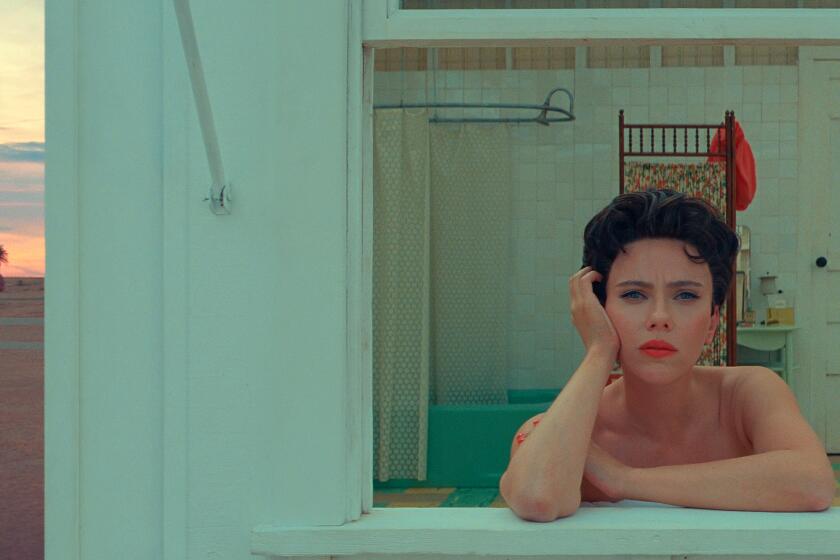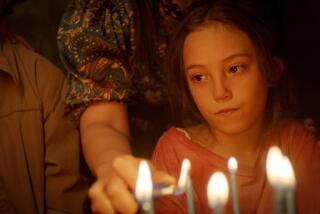Review: In Turkey’s ‘About Dry Grasses,’ a master manipulator barely understands his own heart

- Share via
When we first encounter Samet, the solitary protagonist of Turkish director Nuri Bilge Ceylan’s superb drama “About Dry Grasses,” he’s miserable. Being dropped off in what appears to be the middle of nowhere, he trudges through deep snow, the wind howling, not a soul in sight. Samet is heading back to work after winter holiday — back to the job he dislikes in a small village he loathes. Over the course of the film’s next three hours, he will rarely be less miserable. The only question is how many others he will drag down with him.
Ceylan, the celebrated auteur whose 2014 film “Winter Sleep” won the Palme d’Or at Cannes, specializes in disenchanted individuals struggling against despair, their bleak circumstance set against Turkey’s gorgeous landscapes, the surrounding beauty mocking their anguish. But even by Ceylan’s stringent standards, “About Dry Grasses” is a dour and enveloping affair, featuring one of his most complicated and, ultimately, despicable protagonists. That isn’t initially apparent, but it’s bracingly clear by the end.
Played by Deniz Celiloğlu, Samet resides in İncesu, a sleepy, impoverished community in East Anatolia, where he’s an art teacher at the local school, alongside his easygoing housemate Kenan (Musab Ekici). Samet has one semester left before completing his mandatory four-year stint, and he longs to be transferred to the far-more cosmopolitan Istanbul and be free of a place he uncharitably refers to as a dump.
There are small consolations. Samet is charmed by Sevim (Ece Bağcı), a clever, vivacious student with whom he shares a conspiratorial bond. Quickly, though, we notice their flirtatious rapport, their bodies close as they walk down the hallway, Samet later giving her a gift of a compact. Ceylan doesn’t comment on these moments — instead, he moves on, letting them linger in our memory, gnawing away like a secret we wish we didn’t know. But secrets have consequences, and in “About Dry Grasses,” the repercussions of Samet and Sevim’s chumminess will soon have a chilling ripple effect.

This is only one of the film’s two major plot strands. The other gets underway once Samet meets Nuray (Merve Dizdar), a fellow teacher with whom he’s set up on a blind date. Friendly but guarded, Nuray lost her right leg in a terrorist attack — just one example of the fears threading through Turkey’s subconscious at a time of brutal authoritarian rule and Kurdish bids for independence. Samet and Nuray hit it off, but he later suggests to his roommate Kenan that he should court her — after all, they’re both part of the minority religious sect the Alawites. As for Samet, he seems to believe in nothing except himself.
So begins a tense pseudo-romantic triangle in which the three of them start spending time together, Samet silently envious of the attention Nuray shows Kenan. Meanwhile, Samet encourages young Sevim’s crush, while insisting that he’s uninterested in the smart, independent (and age-appropriate) Nuray. Is his reticence an indication of his desire to be in situations he can control?
“I still haven’t figured people out,” Samet laments at one point, but it’s likely his concern is less one of empathy than it is emotional domination. Known for his slow-burn dramas, Ceylan lights a long fuse that commences with a scandal at Samet’s school but will eventually involve his friendship with Kenan and Nuray. Samet is a man who has so little in his life — the hope that he’ll eventually return to Istanbul, Sevim’s pure affection — that when those kernels are threatened, he reacts in unexpected, malicious ways.
Film critic Justin Chang and culture critic Mary McNamara sat down to discuss their favorites as the 76th Cannes Film Festival draws to a close.
Ceylan’s films enrapture on the big screen, where the vastness of Anatolia’s barren, majestic exteriors dwarf his downtrodden characters’ personal dramas. Immersively shot in widescreen by cinematographers Cevahir Şahin and Kürşat Üresin, with an emphasis on static camera setups that allow the characters to engage in lengthy conversations that often end up as debates, “About Dry Grasses” traps Samet both at school and the world, a sullen man aggrieved that he must endure the indignities of his small-town existence. But actor Celiloğlu keeps challenging our attitude toward Samet, his sad smile and vulnerable eyes occasionally hinting at a buried soulfulness.
Adding to that sense is a series of striking photos Ceylan infrequently inserts into the film — images that Samet, an amateur photographer, takes of locals, which convey a poetry that belies his stoic exterior. Is he a misanthrope? Or merely misunderstood?
Like a rich novel, “About Dry Grasses” takes its time fleshing out its central players, who are each grappling with their own metaphorical purgatories. Ceylan, who co-wrote the script, has a Chekhovian fascination with protagonists weighed down by fate. The effortlessly orchestrated dialogue scenes are riveting, but what’s remarkable is that, no matter how talkative Samet and his cohorts are, they often don’t say what they mean. The characters argue politics, worldviews or how to handle the disturbing accusations leveled against Samet and Kenan at school, but their rhetorical jousting masks unspoken resentments and disappointments.
We’ve mapped out 27 of the best movie theaters in L.A., from the TCL Chinese and the New Beverly to the Alamo Drafthouse and which AMC reigns in Burbank.
“I’m not overly fond of anything,” Samet admits, a rare moment of candor in a movie about people who have learned to muddle through, the relentless snow outside their window seemingly smothering the spark within them. When “About Dry Grasses” premiered at Cannes, Dizdar took home Best Actress, a testament to a muted performance that nonetheless burrows into your psyche, just as Nuray quietly gets her hooks into Samet. Because of Nuray’s disability, audiences might assume she will be the film’s sympathetic saint and moral compass, but nothing in Ceylan’s construction is so simplistic. (If you need proof, look no further than a shocking narrative flourish near the end of “About Dry Grasses,” which finds Ceylan actively interrogating his own meticulously rendered character study.)
Once Samet develops feelings for Nuray — or, at least, appears to develop them — their relationship becomes one of seductive verbal combat. But Nuray is not so easily wooed, and Dizdar brings a grounded intelligence, the character perhaps recognizing Samet’s darker agenda while not entirely caring.
As Samet navigates his final semester, winter giving way to summer, he holds his true intentions close to the vest, his outward signs of cordiality undercut by ugly outbursts when he feels betrayed. Celiloğlu lets those contradictions be a mystery, but only those foolish enough to seek out the best in people will be unable to solve the riddle. With an offhand deftness, Ceylan lays bare the sort of master operator who hides in plain sight, skilled at ensnaring unwitting victims.
The film ends with a plaintive voiceover from Samet that’s so double-edged it’s practically a critique of the cinematic device’s emotional manipulation. This pathetic wretch longs to escape to Istanbul, where he can be around the worldly types he prefers. Anyone unlucky enough to cross his path in “About Dry Grasses” will no doubt be happy to see him go.
'About Dry Grasses'
Not rated
In Turkish with English subtitles
Running time: 3 hours, 17 minutes
Playing: Laemmle’s Royal Theatre, West Los Angeles
More to Read
Only good movies
Get the Indie Focus newsletter, Mark Olsen's weekly guide to the world of cinema.
You may occasionally receive promotional content from the Los Angeles Times.












